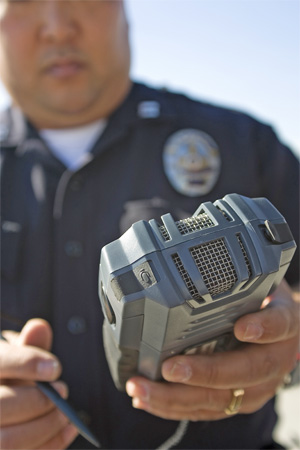 phrasealator
phrasealator
LAPD finds a way to connect
Liz O. Baylen / Los Angeles Times
GETTING THE WORD OUT: Los Angeles police Capt. Dennis Kato demonstrates the Phraselator, a new device that helps police communicate with the public in many languages.
Translation device gives police one-way communication in multiple languages.
By Richard Winton, Los Angeles Times Staff Writer
January 16, 2008
Los Angeles police Capt. Dennis Kato stands in a rooftop parking lot, a device in hand resembling a clunky 1980s-era cellphone.
He selects Korean from the device's menu, then speaks into the microphone: "Medical assistance." A speaker on his vehicle booms in Korean: "If you require medical assistance, please approach the nearest officer."
Switching to Spanish, Kato says: "Welcome." The screen lights up: "Welcome to this event. We are here to facilitate your 1st Amendment rights."
"Bienvenidos a éste evento. Estamos aquí para facilitar sus derechos de la primera enmienda constitucional," the words echo toward the L.A. River.
The Los Angeles Police Department's latest high-tech crime-fighting tool, the Phraselator, enables officers to translate and broadcast thousands of prerecorded phrases in a multitude of languages.
Quietly introduced to the department in late summer, the Phraselator may have found an ideal home in Los Angeles, where police have long struggled to find officers who can communicate in all 224 languages spoken in the immigrant-rich city.
The idea of a simple device that can instantly translate any language is a staple of utopian fiction, from "Star Trek's" universal translator to "The Hitchhiker's Guide to the Galaxy's" Babel Fish. But as anybody knows who has read the sometimes comical texts provided by voice-recognition software, getting translations right is difficult.
The Phraselator doesn't attempt voice-to-voice translation. Instead, the LAPD's bilingual officers -- 32% of the 9,600-member force has some foreign language proficiency -- translate and load standard police commands and questions into the device's computer memory. The translations can be retrieved and broadcast by a simple English-language text or voice word search.
"It is not quite like that translator thing on 'Star Trek.' It's a step or two away," Kato said. "But when it comes to crowd control, natural disasters or medical emergencies, it can be a lifesaver."
The device was developed with the backing of the Defense Advanced Research Projects Agency and used in Afghanistan and Iraq by American soldiers communicating with people in Farsi, Dari, Pashto and other languages.
The LAPD's interest was whetted by the MacArthur Park melee last May, when a disturbance blamed on communication difficulties led to injuries to about 250 protesters and journalists and 18 officers.
As the department retrained officers to avoid a repeat of the situation, Kato said, the federal monitor overseeing the LAPD's consent decree suggested the Phraselator as a way to reach out to non-English-speaking groups.
The LAPD bought four of the $2,500 devices, which at first glance look like Palm Pilots on steroids, and stored 35 crowd control and other commands: "You must immediately leave the area," "Get down from the pole" and "This area has been declared an unlawful assembly."
They've been used at anti-war and immigration rallies in Koreatown and downtown Los Angeles. To reach the crowds, officers broadcast the translations through speakers that can send sound about half a mile without loss of clarity.
An important use, Kato said, could be during natural disasters.
"In Los Angeles, we run into so many languages, and the ability to ask someone you are helping, 'Are you injured?' is so important," he said.
The captain said the system isn't a complete answer to communication breakdowns. The translation function is one-way; it can issue orders but can't decipher responses.
VoxTec Vice President Ace Sarich, who developed the Phraselator, said officers can use the device to ask questions like "What happened here?" and record responses for translation at the station.
Lee Morin, a doctor in the U.S. Navy, came up with the concept for the Phraselator during Operation Desert Storm, uploading Arabic language phrases to his laptop computer for playback to patients, Sarich said. He took the idea to Sarich, a former Navy SEAL and engineer, who initially developed the rugged weatherproof device.
With human translators increasingly reluctant to work in the line of fire or to be seen helping coalition forces, the Phraselator became a godsend for issuing commands at foreign checkpoints, Sarich said. U.S. Navy vessels have used the device to warn vessels to maintain their distance.
The civilian version of Phraselator is rolling out now. Police in Las Vegas have four; there is a multilingual field package for investigating suspected drunk drivers.
Some Florida corrections officers use the device to ask Spanish- and Creole-speaking inmates simple yes and no questions, Sarich said.
Kato said the LAPD is considering buying another Phraselator for its new jail section because custody officers often run into people they cannot communicate with effectively.
"We're really just starting now to see how it might be useful for law enforcement," Sarich said. "It saved lives [overseas]. It can help here."